calsfoundation@cals.org
KOKY
Called the “Greater Little Rock Ebony Station” at its inception in 1956, KOKY was the first radio station in Arkansas to be staffed by African Americans and to feature programming directed toward a black audience. Founded in Little Rock (Pulaski County), the station has featured on-air talent like Leo “Jocko” Carter and Al Bell.
John M. McLendon was a thirty-three-year-old broadcaster from Jackson, Mississippi, who owned three radio stations in Mississippi, including WOKJ in Jackson; like KOKY, WOKJ’s target audience was African Americans. During the summer of 1956, McLendon was granted a license by the Federal Communications Commission to operate a station in Little Rock called “Ebony Radio” until call letters could be established. At 9:00 a.m., October 8, 1956, KOKY-1440 AM began broadcasting as a 1,000-watt station. Such a large crowd sought to attend the open house at KOKY’s headquarters at 1604 West 14th Street that many had to be turned away. Afterward, the KOKY staff and management placed an advertisement in Little Rock’s African-American newspaper the Arkansas State Press “extending a special invitation” to well-wishers who could not get inside the radio station during its opening.
The popularity of KOKY was due in part to the station’s direct involvement with the community, including hosting and sponsoring such events as beauty pageants, talent contests, proms, and charitable events. One such event was the Musical Feast featuring the Southern Wonders singing group. During the early days of the station, much of the broadcast schedule focused on religious programming. R. L. Weaver, the station’s religious director and general manager of the Southern Wonders, brought the group to Jones Temple auditorium in 1957; more than 3,500 people attended the concert. Weaver hosted several weekly programs, including Old Time Religion, Hallelujah Train, and Glory Road, earning him the title as the “Top Religious Radio Personality in Arkansas.” KOKY’s religious programming also featured Upper Room with Leo “Jocko” Carter every weekday at 11:00 a.m. Carter was also president of the West Ninth Street Blues Association and host of a blues show and Jocko’s Jamboree on KOKY.
African-American entertainers traveling through Little Rock would often stop by the KOKY studios for interviews. King Porter interviewed recording artists Shirley and Lee in 1957. In 1956, Little Richard performed before a huge crowd at Robinson Auditorium. To promote the show, Little Richard stopped by the KOKY studios for an interview with disc jockey William “Joy Boy” Jackson.
KOKY also reached out to young black listeners in Little Rock. A program called Teen Time featured Horace Mann High School senior William (Bill) Hill every Saturday afternoon. While a student, Al Bell honed his skills as a disk jockey and marketer at KOKY. Bell spent hours in local restaurants, barbershops, and the Moses Melody Shop record store to learn more about the community’s musical interests and tastes. Bell would begin his shift by saying, “This is your six-feet-four bundle of joy, 212 pounds of Mrs. Bell’s baby boy, soft as medicated cotton, rich as double-X cream, the women’s pet, the men’s threat, the playboys’ pride and joy, the Baby Boy Al”—and he then rang a bell—“Bell.” While at KOKY, Bell interviewed the Staple Singers to promote a concert organized by Bell and R. L. Weaver. Bell would later work with the Staple Singers and other major artists like Otis Redding, Isaac Hayes, Johnnie Taylor, and others as an executive at Stax Records.
In its first year of operation, the station added staff members and increased its operating power from 1,000 watts to 5,000. These improvements were part of a commitment of the station’s staff and management to make KOKY part of the everyday life of listeners.
KOKY experienced several ownership changes over the years and faced many challenges, including a fire in 1962 that took the station off the air. Based in Sherwood (Pulaski County) in the twenty-first century, KOKY airs on 102.1 FM in an Urban Adult Contemporary format, maintains its programming roots by offering All Blues Saturday and Gospel Sunday, and stays connected with the local community through The Broadway Joe Talk Show and other programs. The station also features national hosts in such shows as The Tom Joyner Show and D. L. Hughley. The Internet allows listeners to hear KOKY online anywhere in the world.
For additional information:
“All-Negro Radio Station on the Air.” Hope Star, October 10, 1956, p. 12.
“Arkansas Gets First Sepia Radio Station-News in 1956.” Arkansas State Press, December 28, 1956, p. 5.
KOKY. http://www.1021koky.com/ (accessed February 20, 2019).
“KOKY’s New R. D.” Arkansas State Press, August 9, 1957, p. 8.
“Leo ‘Jocko’ Carter.” Arkansas State Press, August 16, 1957, p. 8.
“Negro Radio Station Goes on Air Today.” Camden News, October 8, 1956, p. 2.
“Musical Feast—Last Tuesday Night, October 1st.” Arkansas State Press, October 11, 1957, p. 8.
“New Manager for KOKY Radio-1440.” Arkansas State Press, August 9, 1957, p. 8.
“New Radio Station for Negroes Given License.” Indianapolis Recorder, July 14, 1956.
“Open House at KOKY.” Arkansas State Press, November 16, 1956, p. 1.
“Thank You.” Arkansas State Press, November 16, 1956.
Thomas, Julia. “KOKY’s Long History of Amplifying Black Voices in Little Rock.” Arkansas Times, May 2019, pp. 52, 54, 56. Online at https://arktimes.com/entertainment/2019/04/26/kokys-long-history-of-amplifying-black-voices-in-little-rock (accessed April 29, 2019).
Michael Bowman
Arkansas State University
 Divergent Prosperity and the Arc of Reform, 1968–2022
Divergent Prosperity and the Arc of Reform, 1968–2022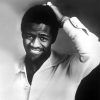 Music and Musicians
Music and Musicians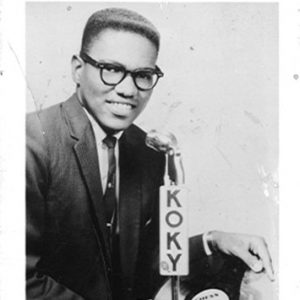 Al Bell at KOKY
Al Bell at KOKY 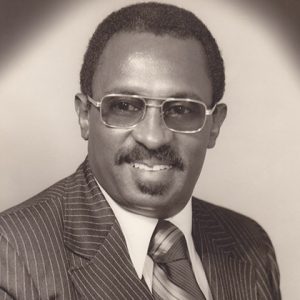 "Jocko" Carter
"Jocko" Carter 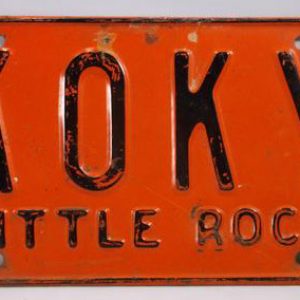 KOKY License Plate
KOKY License Plate 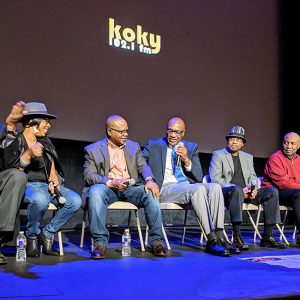 KOKY Panel Discussion
KOKY Panel Discussion 



Comments
No comments on this entry yet.